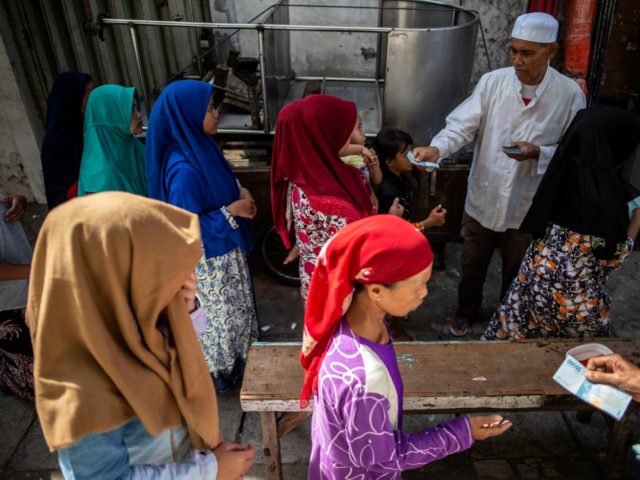Some caliphate-seeking “Islamists” in the world’s most populous Muslim country, Indonesia, are the “first” to step up to the plate and provide assistance during natural disasters on the largest island nation in the world, the Associated Press (AP) celebrated this week.
AP praised a “hardline Islamic group notorious for vigilante violence” — the “Islamic Defenders Front” — for being the “first” group to provide help in the absence of government assistance and international aid organizations when an earthquake and tsunami struck the provincial capital of Palu in Indonesia in September 2018.
Some experts have linked the front to terrorist activities, particularly against Christians and other religious minorities in the country.
The front is not the only Islamist group that has taken up charitable work in Indonesia. Other Islamic groups, including the caliphate-seeking Hizbut Tahrir, “have embraced charitable work, filling a void left by the government and mainstream Muslim organizations,” AP added.
For years, particularly in the wake of the 9/11 attacks, U.S. authorities have connected several Islamic charities to terrorist activities.
Lionizing the Islamic front’s alleged humanitarian activities throughout the article, the AP noted near the end that the group has targeted Christians, adding that Indonesian authorities charged its leader, Rizieq Shihab, with pornography-linked crimes a few years ago. In June 2018, the Jakarta Post reported that law enforcement dropped the probe into Shihab.
AP reported:
The front’s rising political clout was evident in 2016-17, when it mobilized hundreds of thousands to protest the Christian governor of the capital, Jakarta. The governor, an ally of President Joko Widodo, was defeated and imprisoned for blasphemy.
…
There have been other setbacks. Front leader Rizieq Shihab fled to Saudi Arabia in 2017 to avoid arrest on what he said were fabricated pornography charges. An online petition calling for the government to deny legal status to the front has half a million signatures.
Indonesia’s Interior Ministry accused the Islamic group of being involved in “dirty practices,” the wire agency revealed.
A spokesman for the ministry suggested to AP that the front is a wolf in sheep’s clothing, noting that “under law, organizations involved in social or humanitarian work should not be a guise for political activities.”
Maman Suryadi Abdurrahman, the head of the front’s military arm known as the Islamic Defender Troops militia, told AP:
Our goal is to make Indonesia, in which Islam is the majority religion of the people, to be religious and clean from immorality. We want an Islamist country, not an Islamic state, because a religious country will prevent the nation from suffering social injustice. …We’ve tried to improve our image. We’ve changed the ways of our demonstrations to be more persuasive and peaceful.
Although it claims to have “moderated its methods,” the front aggressively combats what it considers “community diseases” such as prostitution, homosexuality, and the celebration of Western holidays, claiming that it does so at the behest of local communities, AP reported, adding:
Since its inception two decades ago, the front has pushed for Islamic law to govern the lives of Indonesia’s 230 million Muslims, aiming to correct what it sees as the errors of Indonesia’s 1945 constitution that established a secular state and religious freedom.
Acknowledging that the Islamist non-governmental group (NGO) is “often dismissed as a fringe group,” the American news wire agency noted that the organization had gained political ground in recent times amid “the growth of orthodox Middle Eastern Islam in Indonesia.”
AP pointed out that the Islamic Defenders Front maintains a “military-like command structure” and presence in 23 (about 70 percent) of Indonesia’s 34 provinces.
The NGO reportedly originates in the capital of Jakarta and is made up of elements of Indonesia’s military after the fall of dictator Suharto in 1998. It was reportedly formed to combat pro-democracy activists and liberalism.
The Islamic front came into prominence by participating in protection rackets and violent vigilantism.
Abdurrahman boasts that the NGO has about one million members. However, AP learned from researchers that the group’s membership is much smaller and likely stands in the tens of thousands.

COMMENTS
Please let us know if you're having issues with commenting.